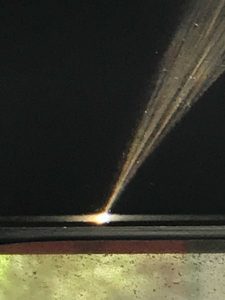Nova Scotia and the Clouds of Summer
So silently they march along,
the clouds of summer, proud and strong;
their grand approach from yonder shore
majestically they wander o’er.
Not for the likes of me to know
from whence they come, where e’er they go,
for I am but a fledgling lass;
I stand in awe and watch them pass.
A Tiny Comet
A tiny comet flew across
our bedroom window pane;
she was there but for a moment—
not long did she remain.
We thanked her well for
____stopping by—
a blessing, we believe—
this little treasure from the sky,
and then she took her leave.

A Summer’s Day
Blue skies at sunrise,
__The dawn of the day;
Clouds in the heavens
__That drift where they may;
Showers of flowers
__Aswirl on the breeze;
Petals that settle
__Wherever they please;
Honey bees hover
__Alighting upon
Buds that unfurl
__With the grace of the swan;
Daisies that sway
__In the gentle moonlight;
Crickets in thickets,
__The chorus of night.
Joe Tessitore is a retired New York City resident and poet.















Thanks, Joe. I liked them all, but the 1st one, “Nova Scotia and the Clouds of Summer” is my favorite.
What s beautiful group of poems. Light but meaningful
All of these poems express a wonder at the delights of nature. My favorite is “A Summer’s Day”. Congratulations!
Again, you have taken me back to “A Child’s Garden of Verses,” Joe! What lovely little snapshots of summertime’s simplicity, sweetly spoken. 🙂
There is nothing like nature to depict the beauty of our world. Nice poems.
Hi, Joe–
All three poems are well made. Good work!
I love all your poems because they put a smile on my face and a peaceful feeling throughout my day.
How sweet are you?
Thank you all very much!
Your words are lovely, Joe. You beautifully depict the image.
Joe,
It’s in my nature to nitpick. For future reference, “from whence” is a tautology. “Whence” has a built-in “from.” Just write “whence.”
Joe,
A clarification: “Whence” means “from where.” And BTW all three of these poems were toothsome and easily digested.
Thanks C.B.
I’m a nit picker as well and hopefully there’s a place for us.
Can one plead poetic license to maintain meter in a case like this?
Joe,
Maybe, but poetic license is usually reserved for violations of accepted reality. Perhaps “From whence” could have been replaced with “Just whence they come, or where they go.” Avoiding also the archaic contraction “e’er.” As it happens, I like that contraction, but that puts us in a small restricted group, which isn’t the worst place to be.
Joe, I also enjoyed the mirth and happiness that you packaged so well in these delightful poems. My only suggestion is that the final poem could be improved by removing the word “the” from the final line of the last two verses. Doing this would maintain the sense but also preserve the meter. It is a small thing, of course, but I stumbled on the rhythmic bump as I read and found it an unnecessary distraction from an otherwise good effort.
Thanks so much James. The couplets in this one were ten beats each, and so the final two.
There was a next-to-last verse that I didn’t get to Evan in time:
Alpenglow sunset,
evening is nigh
Lonely the egret,
toward home does she fly
Mr. Tessitore, Hello. It’s late so I must be fast.
Nova Scotia and the Clouds of Summer. 1. I like the double-word rhyme: “yonder shore” and “wander o’er,” 2. “where e’er they go” is a bit awkward for me to say. I might change it to “or where they go.” 3. I would change the last two lines to read: “As I am but a fledgling lass, I stand in awe and watch them pass.” The “As” would give you assonance with “lass” and “pass.”
A Tiny Concert. 1. Since there is an extra beat at the end of L3, I would remove a beat from the start of L4. In other words, L4 would go: DA da DA da DA. 2. Because there is no verb in L8, I would either put L8 between the dashes (with appropriate modification), or else make L8 and L9 one sentence, something like: “This little treasure in the sky decided then to leave.” Hopefully something less mundane than this, but I like the flow of the last two lines being one sentence.
A Summer’s Day. 1. I love this meter: dactyl-dactyl-dactyl-extra beat. 2. My problem is that I read “Blue skies” as an iamb, which threw off the meter. I would try to start L1 with something that is unambiguously a dactyl, as you have done in all the other odd-numbered lines. 3. Love the internal rhymes. Great poem.
Thanks so much Mark for your kind words and for taking the time to be so helpful.
Gonna take me some time to consider your advice!
Joe, your trio of nature poems are expressive and succeed in capturing the beauty of fleeting moments. My favorite is ‘A Summer’s Day’ because the internal rhymes add to its musicality.
Thank you David, thank you all!
Joe,
Maybe, but poetic license is usually reserved for violations of accepted reality. Perhaps “From whence” could have been replaced with “Just whence they come, or where they go.” Avoiding also the archaic contraction “e’er.” As it happens, I like that contraction, but that puts us in a small restricted group, which isn’t the worst place to be.
I think that archaic contractions like “e’re” are to beautiful to avoid and, if we use them in context, can be understood by many.
“Archaic” has an unfortunately negative connotation which I don’t think is justified.
Kip Anderson is correct that “from whence” is tautological. The English adverbs of location and direction “where,” “whence,” and”whither” are not supposed to be prefixed with prepositions. “Where” means “in what place,” “whence” means “from what place,” and “whither” means “to what place.” Both “whence” and “whither” have died out in common speech.
Before their total disappearance, however, there was an intermediate stage in the 19th century when English speakers used the constructions “from whence” and “to whither.” The same thing happened with the related triplet “there,” “thence,” and “thither.” I myself recall an older translation of the Apostles’ Creed, where the phrasing went “from thence He [Christ] shall come to judge the living and the dead.”
There is another triplet: “here,” “hence,” and “hither.” Again, the last two have dropped out of common usage.
If you want to see the complexity that we have lost because of this telescoping of all three paradigms of the adverbs of location and direction into “where,” “there”, and “here,” read this quatrain (30) from the Rubaiyat:
What, without asking, hither hurried whence?
And, without asking, whither hurried hence!
Another and another Cup to drown
The Memory of this Impertinence!
Not one of my students has the slightest idea what the first two lines mean. But I kick their behinds hard until they learn all three original paradigms.
I too remember “from thence He shall come to judge the living and the dead.”
Our current “from there …” quite literally pales in comparison.
Joe,
An absolutely lovely reply and analysis. My life might have gone much better if I had majored in English instead of Ethnomusicology.
Joe, I continue to like your poems that I have read so far. I do have one small suggestion. In the line:
With the grace of the swan
I wonder if “a swan” might be slightly better.
I vote with Father (being the good Catholic that I am!): “A Summer’s Day” is my favorite.
New to SCP, I am impressed with the quality of verse and commentary.
Joe, I am trying to perfect the lyric (using the Provencal troubadours as guides) and you are proof that our Bastard Tongue (God bless us all!) steals the best and can be the best in musicality and rhythm. Adelante, amigo!